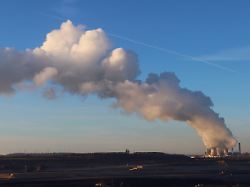Habeck: Power plant plan coming
Report: Power supply secured until 2031
2/1/2023 at 8:29 p.m
The Federal Network Agency has examined the security of supply in Germany with electricity. If all the steps that have been decided on are implemented, there is no need to worry. The industry points out that the projects are far from sufficient. Minister Habeck calls for “discipline and consistency” when expanding capacities.
According to estimates by the Federal Network Agency, the power supply in Germany is secured with the current plans of the Federal Government into the new decade. “The decisive statement is that in the period up to 2031, the German energy supply will be secure, that sufficient energy and electricity will be available at all hours of the year and that the grid, if it is expanded, will be sufficient to handle these amounts of electricity transport,” said Federal Economics Minister Robert Habeck. “This also applies if electricity consumption increases significantly due to new consumers such as electric vehicles and heat pumps and the coal phase-out takes place by 2030.” The Federal Cabinet approved a corresponding report by the Federal Network Agency. However, there is also criticism of the report.
The authority examined “the development of the electricity market with the legally planned expansion of renewable energies, the conversion of the power plant park and the grid expansion,” explained the Federal Ministry of Economics. According to this, the electricity system is so robust when the goals set are implemented “that security of supply would continue to be guaranteed if ten gigawatts (GW) of generation capacity were less on the market”.
The revised renewable energy laws envisage that the production capacities of onshore and offshore wind farms and photovoltaic systems will increase to 360 GW by 2030. In addition, the transmission and distribution grids are to be expanded. However, the expansion of renewable energies must be massively accelerated in order to achieve these goals.
Power plant strategy announced
Habeck emphasized that “discipline and consistency” are now required when expanding green power plants and networks. A power plant strategy is also needed that guarantees security of supply in times when there is not enough green electricity. “We are resolutely pushing ahead with the conversion of our energy supply. This applies to the expansion of renewable energies, the expansion of the grid and the modernization of the power plant park. To this end, we are launching a power plant strategy in the first half of this year so that the power plants can be built that are suitable for a climate-neutral electricity system is needed. New power plants must be hydrogen-ready and must be planned from the outset. We will set the framework accordingly,” the Greens Minister continued.
The Federal Association of Energy and Water Management (BDEW) warned against excessive optimism. “Germany must make a spurt at an unprecedented speed if this transformation to a climate-neutral electricity system is to be achieved by 2035 while at the same time phasing out coal by 2030,” said Kerstin Andreae, head of the association. “The political objectives are enormously challenging and so far only partially supported by measures.” Germany wants to phase out coal by 2038 at the latest. According to the coalition agreement, the exit should “ideally” succeed by 2030.
E-cars should help out
The Federal Network Agency’s report states that additional controllable power plants are needed to meet the demand for electricity when electricity and wind energy are not sufficient. Habeck is planning new power plants that can be operated with hydrogen. The ministry also referred to “flexible loads and storage” to regulate electricity demand. For example, the storage capacity of electric cars should help to balance out consumption peaks.
Andreae qualified that “substantially improved framework conditions” are needed for all of these projects. The report also makes “very optimistic assumptions” when it comes to network expansion. The Federal Network Agency had by no means presented a “stress test”, but merely stated “that the security of supply is guaranteed if all the premises are met”.
CDU Vice Jens Spahn accused Habeck of “politically motivated optimism”. “I would wish for fewer health prayers and more concrete action, because 2030 – that’s soon and we will definitely need reliable electricity and energy for Germany,” he told ZDF.
